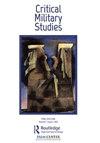Somewhere over the rainbow (crossing): reflections on LGBTQ allyship at NATO
Q1 Arts and Humanities
引用次数: 0
Abstract
In June 2019, I found myself at NATO headquarters in Brussels, staring at a poster featuring a rainbow flag superimposed with silhouettes of armed forces personnel. It was an unexpected encounter. I was there along with my co-authors to launch our new book (Wright, Hurley, and Gil Ruiz 2019) and participate in the 43 Annual Conference of the NATO Committee on Gender Perspectives (NCGP). In the conference programme, what was billed as a ‘side-event’ discussing ‘integrating LGBTQI perspectives in allied and partner armed forces’ was scheduled for the upcoming Thursday. I was curious. NATO is dominated by cisgendered, heterosexual, militarized masculine norms (Ibid) and is an alliance made up of 30 member states with differing socio-cultural and military levels of LGBTQ rights. The inclusion of such an event, in such a space, felt a little radical. There were murmurings among the delegates. Holding the event within the framework of the NCGP conference was an interesting move. Including it as a side-event, noted on, but not part of, the official schedule of the NCGP conference, provided some delegates an opt-out. The event was organized jointly by the European Organisation of Military Associations and Trade Unions (EUROMIL), the Permanent Representation of Belgium to NATO and the Joint Delegation of Canada to NATO. Another interesting move. EUROMIL is an international non-profit organization which promotes military professional organization and trade union membership for European (not just NATO) soldiers and ‘the inclusion of military service personnel into the social and labour legislation of the European Union’ (EUROMIL, n.d.). One of its core goals is to ‘promote the fundamental rights and freedoms of members of the armed forces in Europe’ (Ibid). The exact motivations for the Canadian and Belgian delegations were not immediately clear, but both states are understood to be (more) inclusive in their LGBTQ (social and military) policies in a way that other NATO states are not. Of course, reading Canadian and Belgian ‘progressiveness’ vis-à-vis ‘other’ NATO members is neither uncontested nor unproblematic. Whatever the motivations, the alignment of these two national delegations with EUROMIL allowed for an LGBTQ rights and inclusion-focused space to emerge within an already established gender rights and inclusion-彩虹之上的某处(穿越):对北约LGBTQ联盟的反思
2019年6月,我发现自己在布鲁塞尔的北约总部,盯着一张海报,海报上有一面彩虹旗,上面叠加着武装部队人员的剪影。这是一次意外的相遇。我和我的合著者一起在那里推出了我们的新书(Wright,Hurley,and Gil Ruiz 2019),并参加了北约性别观点委员会(NCGP)第43届年会。在会议计划中,被称为讨论“将LGBTQI观点融入盟军和伙伴武装部队”的“附带活动”定于即将到来的周四举行。我很好奇。北约由顺性别、异性恋、军事化的男性规范主导(同上),是一个由30个成员国组成的联盟,具有不同的社会文化和军事水平的LGBTQ权利。把这样一个事件放在这样一个空间里,感觉有点激进。代表们窃窃私语。在NCGP会议的框架内举办这次活动是一个有趣的举措。将其作为一项附带活动列入NCGP会议的官方日程,但不是其中的一部分,为一些代表提供了退出的选择。此次活动由欧洲军事协会和工会组织、比利时常驻北约代表团和加拿大驻北约联合代表团联合组织。另一个有趣的举动。EUROMIL是一个国际非营利组织,旨在促进欧洲(不仅仅是北约)士兵的军事专业组织和工会成员资格,并“将军事服务人员纳入欧盟的社会和劳工立法”(EUROMIL,n.d.)。其核心目标之一是“促进欧洲武装部队成员的基本权利和自由”(同上)。加拿大和比利时代表团的确切动机尚不清楚,但据了解,这两个国家在其LGBTQ(社会和军事)政策中(更)包容,而其他北约国家则不然。当然,解读加拿大和比利时相对于“其他”北约成员国的“进步性”既不是毫无争议的,也不是没有问题的。无论动机是什么,这两个国家代表团与联利观察团的结盟都允许在已经确立的性别权利和包容中出现一个以LGBTQ权利和包容为重点的空间-
本文章由计算机程序翻译,如有差异,请以英文原文为准。
求助全文
约1分钟内获得全文
求助全文
来源期刊

Critical Military Studies
Arts and Humanities-History
CiteScore
1.90
自引率
0.00%
发文量
20
期刊介绍:
Critical Military Studies provides a rigorous, innovative platform for interdisciplinary debate on the operation of military power. It encourages the interrogation and destabilization of often taken-for-granted categories related to the military, militarism and militarization. It especially welcomes original thinking on contradictions and tensions central to the ways in which military institutions and military power work, how such tensions are reproduced within different societies and geopolitical arenas, and within and beyond academic discourse. Contributions on experiences of militarization among groups and individuals, and in hitherto underexplored, perhaps even seemingly ‘non-military’ settings are also encouraged. All submitted manuscripts are subject to initial appraisal by the Editor, and, if found suitable for further consideration, to double-blind peer review by independent, anonymous expert referees. The Journal also includes a non-peer reviewed section, Encounters, showcasing multidisciplinary forms of critique such as film and photography, and engaging with policy debates and activism.
 求助内容:
求助内容: 应助结果提醒方式:
应助结果提醒方式:


